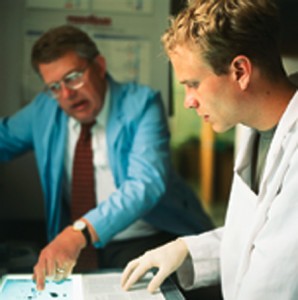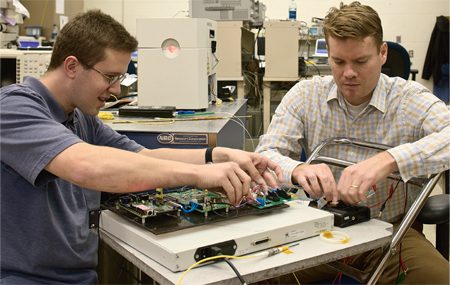
Through mentored learning environments like this between associate professor of chemistry and biochemistry Daniel L. Simmons, ’78 (left), and Nathan K. Evanson, ’02, students are at once instructed and engaged in the search for truth.
By President Merrill J. Bateman
At Brigham Young University we have the privilege of being engaged in the loftiest of pursuits—the search for truth and the dispensing of it. From the beginning this school has emphasized teaching, or the dissemination of truth. A hallmark of this university is the attention that faculty give to students. But given a 90:10 undergraduate-to-graduate student ratio and an emphasis on quality instruction, is the search for truth at BYU relegated to a second priority behind the dissemination of it? The answer must be no! The discovery of truth is as important at this university as its dissemination.
During the past three decades, increased funding has allowed faculty to balance their responsibilities in a manner that makes both the discovery of truth and quality teaching possible. That, combined with quality faculty, has resulted in a paradigm shift, a shift from teaching versus research to teaching through research. The new paradigm has faithful scholars involved in extending the frontiers of knowledge while mentoring their students in the discovery process.
My experience at five universities suggests that the best teachers, sacred or secular, are engaged in the discovery process. The ideal faculty member at BYU or at any other teaching university is the person who is blazing a trail along the research frontier and is effective in sharing basic principles as well as his or her advanced specialty with undergraduate students.
I believe this can most effectively happen through mentored learning environments—focused research situations in which students work side by side with professors in the discovery of truth and understanding. These mentored learning environments are faculty initiated. Professors conceive of and design research projects that involve graduate and undergraduate students in the lab, in the field, and in the studio. These environments allow a level of undergraduate student participation that is uncommon at large universities like BYU.
To enable and encourage our faculty to create these environments, BYU has committed significant research funds for which faculty and students can apply. In 2001 the university disbursed nearly $600,000 for faculty mentored environment grants. We have set a goal to raise that a substantial amount each year through the creation of an endowment.
Thanks to such funds this year students will work alongside faculty mentors in studying the relationship of dietary selenium intake and the reduced risk of prostate cancer; they will investigate how family relationships influence the well-being of children in Latin America; they will analyze the grammar, morphology, etymology, semantics, and syntax in Emily Dickinson’s poetry; they will evaluate patient-care delivery models in managed-care environments; and they will assist in laying the foundation for the future study of gene therapy treatments for osteoarthritis. Through these studies and many others, students will learn research techniques, document their findings, write and publish academic papers, and most importantly, learn alongside our university’s finest teachers and researchers. And our faculty will have the opportunity to continue their quest for knowledge and truth with the assistance of our outstanding undergraduate student body. Thus teaching and research become means to the same end.
The Savior himself set the example of teaching one by one. During his visit to the Nephites in the Western Hemisphere, he extended the following invitation to the multitude
Arise and come forth unto me, that ye may thrust your hands into my side, and . . . feel the prints of the nails in my hands and . . . feet, that ye may know that I am the God of Israel, and the God of the whole earth, and have been slain for the sins of the world. [3 Nephi 11:14]
The record indicates that the multitude went forth “one by one until they had all gone forth, and did see with their eyes and did feel with their hands, and did know of a surety” (3 Nephi 11:15; emphasis added). Although the multitude totaled 2,500 souls, “all of them did see and hear, every man for himself” (3 Nephi 17:25).
Some truths are only learned “every man for himself,” taught by caring and concerned teachers, as in the example of our Savior. BYU can emulate that example through offering students mentored learning environments.
Info: Mentored learning grants are made possible by the BYU Annual Fund. Donations can be made at annualfund.byu.edu.









